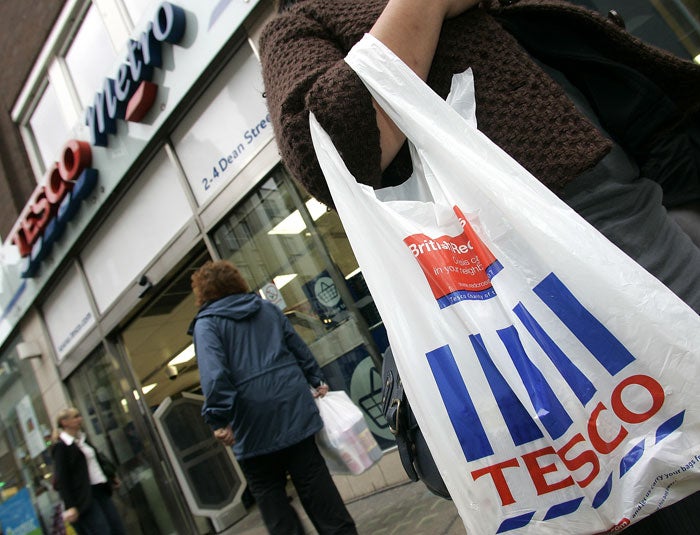Small shops lose out as regulators back power of the supermarkets

Your support helps us to tell the story
From reproductive rights to climate change to Big Tech, The Independent is on the ground when the story is developing. Whether it's investigating the financials of Elon Musk's pro-Trump PAC or producing our latest documentary, 'The A Word', which shines a light on the American women fighting for reproductive rights, we know how important it is to parse out the facts from the messaging.
At such a critical moment in US history, we need reporters on the ground. Your donation allows us to keep sending journalists to speak to both sides of the story.
The Independent is trusted by Americans across the entire political spectrum. And unlike many other quality news outlets, we choose not to lock Americans out of our reporting and analysis with paywalls. We believe quality journalism should be available to everyone, paid for by those who can afford it.
Your support makes all the difference.Regulators have been accused of failing to rein in the power of the biggest supermarkets as campaigners warned that consumers would face less choice with more small shopkeepers squeezed off the high street.
In the latest instalment of its investigation into the grocery sector, the Competition Commission produced good news for farmers with new plans to appoint an ombudsman to resolve disputes between the biggest retailers and their hard-pressed suppliers. A new "competition test" to be considered by local authorities when granting permission for new stores was also announced in the hope of preventing the creation of further so-called "Tesco towns" – places where a single chain dominates.
However, the Commission fell short of ordering the biggest players – Tesco, Asda, Sainsbury's and Morrisons, which control 70 per cent of the sector – to sell off their stockpiled land holdings or divest themselves of shops. But it will require retailers to end the practice of imposing restrictive covenants that prevent land being sold to competitors. A new Grocery Supply Code of Practice designed to improve the relationship with suppliers will replace the existing Supermarkets Code of Practice. It will be extended to include other chains such as Waitrose and Marks & Spencer.
Asda, Sainsbury's and Tesco welcomed the commission's recommendations. An Asda spokesman said the proposals would lead to "more competition at a local level" – shorthand for allowing it to catch up on its chief rival Tesco. Sainsbury's said it would be co-operating fully with the commission to ensure "the best possible outcome for customers".
Tesco said an ombudsman and competition test would create more red tape. "Tesco considers that introducing a new ombudsman could be bureaucratic and an unnecessary cog in a supply chain which has worked well for consumers," a spokeswoman said.
But environmentalists and smaller retailers said the new proposals did little to promote genuine retail choice or stem the closure of specialist shops. The Federation of Small Businesses' trade and industry chairman, Clive Davenport, called for an independent regulator with real teeth to be set up to police the retail sector. "The idea for an ombudsman to oversee the relationship between supermarkets and suppliers is a reasonable one, but it does not go far enough," he said.
"There are many more issues, such as below-cost selling and free parking for out-of-town shopping centres that the Competition Commission has failed to address properly."
A Friends of the Earth supermarket campaigner, Sandra Bell, said the competition test will do nothing to help local shops or to promote retail diversity. "Unless it is combined with strengthened planning rules to restrict supermarket expansion it could simply mean that we get more big supermarkets being built next to each other," she said.
An ActionAid policy analyst, Dominic Eagleton, welcomed the proposed ombudsman, but warned: "Any regulator must have a global reach, as supermarkets are global businesses that buy goods worth £7m every day from developing countries."
The British Retail Consortium director general, Stephen Robertson, said there was no need for more regulation and the commission already accepted the status quo was delivering good value for customers.
The Commission decided not to make any recommendations concerning the need test currently applied to planning decisions which promotes development in town centres. Hazel Blears, the Communities Secretary, has already indicated the test will be dropped.
The Commission is inviting responses to its package of proposals and a final report is expected to be published by the end of April.
Who benefits?
* Supermarkets
Asda and Sainsbury's welcomed the proposals. They are embroiled in a struggle against market leader Tesco, which has fiercely resisted the introduction of a competition test. Tesco will be relieved the Commission is not ordering chains to sell off their land holdings or any of their shops. M&S and Waitrose will also be covered under the new code of practice.
* Consumers
The Commission believes that supermarkets serve the consumer well and has even recommended more should be opened. But campaigners claim that the big chains will be increasingly built on out-of-town sites, accessible only by car, while creating "food deserts" in inner-city areas where food becomes increasingly expensive and difficult to find.
* Small shops
Small retailers are closing their doors at the rate of 2,000 shops a year. Any more supermarkets are bad for them. They are powerless to compete with the big chains' aggressive discounting policies and free parking offered at out-of- town developments. Failure to fully enshrine the principle of town centre first will hurt them.
* Farmers
Suppliers to the big supermarkets are the big winners in this review. The ombudsman will have the power to investigate and award compensation to those farmers and processors hurt by so-called bully boy buying practices. But some fear the supermarkets will simply pass on the costs of the new controls – about £150m a year – by squeezing suppliers further.
Join our commenting forum
Join thought-provoking conversations, follow other Independent readers and see their replies
Comments